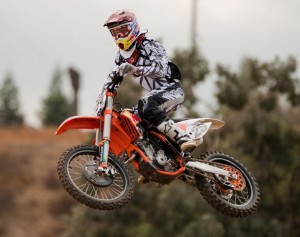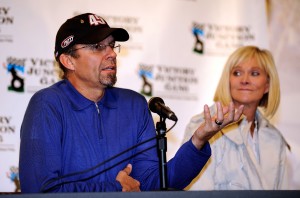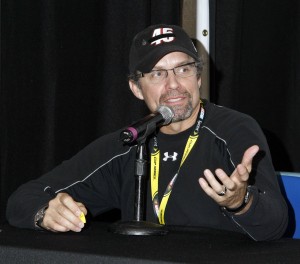
Kyle Petty has been away from full-time racing since 2008, but during the time since he’s found a comfortable role as an analyst for SPEED, NASCAR.com and TNT’s summer race coverage.
As a driver and now a member of the media, Petty has always been one of the most popular figures in the NASCAR garage due largely to his charitable works. Inspired by his late son Adam (who died tragically in 2000 during a race practice in New Hampshire), Petty spearheaded the building of Victory Junction Gang Camp, which caters exclusively to children with chronic diseases.
Inspiring Athletes recently caught up with Petty and the result is this two-part conversation. In part one, Petty talks about his father Richard Petty’s induction into the NASCAR Hall of Fame, what current drivers are Hall of Fame material, and what’s happening with the development of a brand new Victory Junction Gang Camp in Kansas City:
Chad Bonham: Do you feel comfortable now that you’ve fully transitioned into broadcasting?
Kyle Petty: Yeah, if this is going to be my job, I’d better feel comfortable with it.
Bonham: What do you enjoy most about working at SPEED and calling races for TNT?
Petty: Really, it’s just hanging out at the race track. That’s the main thing. That’s the big part. Obviously you drive a race car for so many years and then when you go do something else, you don’t get to be around the people you always grew up with and the people that you’ve always been around. Doing the TV stuff lets me be around those people, so that’s the best part of it.
Bonham: I suppose being around the track is also a benefit to your charitable work and keeps you in the forefront of people’s minds, right?
Petty: Yeah, it keeps you engaged. Obviously it keeps you at the race track and that’s where a lot of the donor basis is. The NASCAR fans are your donor base. If you can stay engaged with those people, the better off you are.
Bonham: Do you miss anything about driving?
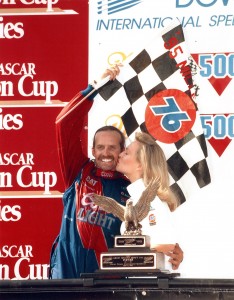
Petty: The only part I miss about driving is driving. That’s it. I don’t miss all the other stuff that goes along with it—all the other PR stuff. Anybody, when they quit driving, they miss the driving part. It’s the physical getting in the car for the race.
Bonham: So do you miss driving against the other guys and trading paint?
Petty: I just loved the driving part. Look, if I didn’t race anybody, it didn’t make any difference as long as I could drive. That’s what I’m trying to say. It’s just the physical part of getting in the car and being able to go run fast and being able to drive. That was the fun part.
Bonham: Is there any scenario that would find you back behind the wheel of a car?
Petty: No. Out of the question.
Bonham: I enjoyed watching you soak up the NASCAR Hall of Fame moment with your dad. How special was that time for your family?
Petty: Obviously it was cool for my family and it was cool for my father. My father’s in it, my grandfather’s in it, and now (my dad’s crew chief Dale) Inman’s in it. So when you look back on growing up, those are the guys that you watched and the guys you paid attention to and then you realize that all those guys are in the Hall of Fame. That’s a big deal. Obviously for my father to be in the first class, that was a huge deal for our family. You can look at that in so many different ways. With our grandfather getting in this year and Dale getting in next year, we’re going to be a part of the Hall of Fame induction thing for a while.
Bonham: What current drivers in the Sprint Cup Series do you think are a lock to make it into the Hall of Fame someday?
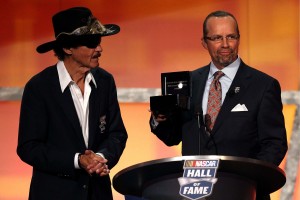
Petty: Jeff (Gordon) and Jimmie (Johnson). Jeff and Jimmie, for sure. How do you know? With Mark (Martin)’s body of work, I would put him in there in a heartbeat. Then you’re going to have to drop back and look. Tony (Stewart) is a great guy. A lot of those guys have won some things, but does 10 or 12 races get you in the Hall of Fame? Does 20 races get you in the Hall of Fame? What else have you done? I mean, what Kyle Busch does in all three divisions is huge but he’s only 26. If he keeps up that pace, he may be the one that moves to the top of the heap. It’s really hard to say.
Bonham: How are things going at Victory Junction Gang Camp?
Petty: The camp is going really good. When you look at stuff with the economy the way it is, obviously everything’s slowing down a little bit. It’s slowed down for us too. But at the same time, you look at where we’re at and what’s going on now and we’re still able to continue to grow. It just continues to get better.
Bonham: When you get to hang out at the camp with the kids today, do you still get the same feeling you did when you first opened it up back in 2004?
Petty: Oh yeah. Yeah. That part of it never changes. Being around the kids, talking to the kids, that part’s never going to change. I don’t care if you get to be a hundred years old. That part’s never going to change.
Bonham: For those who have never been there, how can you describe why that place is so special?
Petty: The special part about camp is the kids. It’s like asking, “What’s the special part about Disney?” You can stand back and look at Disney and think the coolest part is all the cool rides and all the cool buildings and everything everybody does. And then, the kids get there and you see the look on a five-year old’s face, you see the look on a 10-year old’s face and you’re like, “Oh my God. It’s really not about all the stuff we do. It’s about the kids.” That’s really what camp is. The camp is just a regular camp. If you’ve been to Boy Scouts camp, Girls Scouts camp or any kind of camp, when you experienced that environment and what camp meant to you, then that’s all camp really is. (Victory Junction Gang Camp) is just for children that happen to have chronic and life-threatening illnesses. That’s the only variation on the whole thing. It’s what the kids that come to camp feel. They’re not able to go to other camps. So it’s just all about the kids.
Bonham: Where are things at with the Kansas City camp and how has the slowed progress tested you?
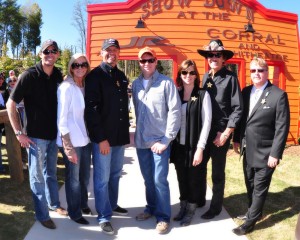
Petty: It’s going good. You know it’s funny. We all talk about that camp. We all look at it and we know we’re going to do it. That’s as simple as it is. You run into a roadblock every now and then and you just keep plugging along. That’s kind of the same way it went in North Carolina. We had a piece of property, it didn’t work out for us and we moved to another piece of property and it looks like it’s going to work out for us, and along with all that stuff the economy changed. So there’s some hiccups that you run into when those things happen. But the funny thing is, from the outside, people see them as issues, but from the inside, we don’t see them as anything. We just see them as part of the process. We ran into the same stuff in North Carolina. Everything’s not smooth. Everything’s not a bed of roses. You’re going to have issues no matter what you do. We’ll get that a lot from people. They’ll say, “Oh, you guys are behind in Kansas.” But not really. It just doesn’t seem like it’s been a big deal for us. We just keep plugging away.
Bonham: When you know it’s something you’re supposed to be doing and it’s almost like a calling, doesn’t it make it easier to deal with those challenges?
Petty: Oh yeah. If you love it, it doesn’t matter what you do, if you love what you do, then you don’t sweat the little things. You just don’t pay attention to them. Then when the big things come along, they’re never as big as what they seem to somebody who doesn’t have a passion for it and doesn’t really love it. I think that’s the way we look at it. When stuff comes along, it’s just another issue we have to deal with. It’s not a roadblock. It’s not a stumbling block. It’s not a time to throw in the towel. It’s, “Hey. We’ll just work around this.” That’s the way it’s always been. That’s the way it was at Victory Junction and that’s the way it is with a race car. People that fold up their tent and go away probably didn’t believe in what they were doing in the first place.
For more information about Victory Junction Gang Camp, check out the official website HERE.
You can follow Petty’s NASCAR.com online video broadcasts including archives of SPEED’s “Trackside” and “30 Minutes You’ll Never Get Back” by clicking HERE.
Click HERE to check out part two of the Inspiring Athletes interview with Kyle Petty.
